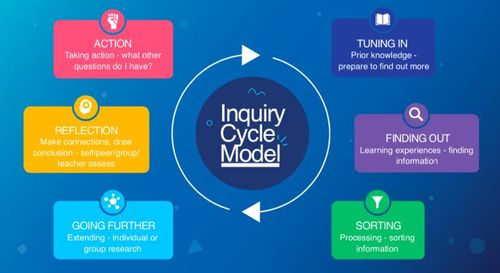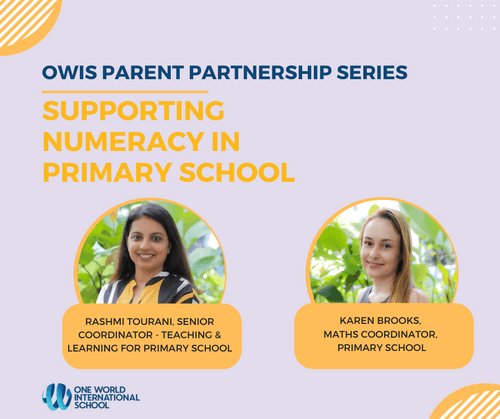At One World International School, learning comes alive for students as they discover their passions and interests through different avenues of learning, for example, taking on a role similar to junior scientists, formulating and testing hypotheses. Through the Inquiry Cycle, they explore new knowledge and ideas in authentic contexts; developing critical thinking and problem-solving skills to help them become successful for a future unknown. This type of learning ignites a passion for gaining knowledge and skills that will stay with them throughout their lives. They are able to learn to take ownership of their development and understand the importance of always asking questions and looking deeper.
-min.jpg)
What is the Inquiry Cycle?
The Inquiry Cycle encourages students to formulate questions and explore possible solutions. Although the process is similar to scientific inquiry, it can be applied to a variety of other subjects, too. These basic skills learnt within the Inquiry Cycle are easily transferable between subjects. Inquiry involves both inductive and deductive reasoning and consists of several phases. Within each phase, students are encouraged to ask questions and to delve deeper into the topic. The core of the cycle is reflection on personal understanding. This is a skill that will be essential throughout our children’s lives. Terminology describing the phases and the order in which they are applied may vary depending on the topic under investigation and the approach the teacher is using. However, most inquiry cycles consist of the following components:
● Orientation introduces the learning topic and may be initiated by teachers, students or even situations that stimulate learners’ interests. Within this phase, students are encouraged to ask questions such as: What do I already know about the topic? Do I have any experiences with this topic? What are my questions, feelings and emotions about the topic and what more do I want to know? At OWIS, we call this “tuning in.”
● Conceptualisation begins with generating research queries and hypotheses and allows students to understand related concepts. They are encouraged to note their questions and ideas down before they begin their research. Students then begin gathering information. They are given freedom to use different resources to find the information they wish to seek. They are taught how to analyse whether the information they are finding is up to date and from a reliable source and how to sift through information to find the appropriate information they are trying to gather. At this point, it is important for them to consider other people’s views on the topic and to liaise with their peers. We refer to this as “finding out”.
● During investigation, or “sorting out”, students let their curiosity direct them toward exploration, experimentation and data-interpretation. They are given the opportunity to sort through their information and to analyse their findings. At this point, they may ask questions such as: Have I found the information I was looking for? Did it correlate with my hypothesis? Do I need to make any changes to my inquiry, and how can I connect this new information with what I know? This is an analytical point in the cycle, and the students gain key skills.
● Groups of students extend and personalise their learning during the “going further” stage. They come together to share their findings and to see if others can fill in any gaps in their research or give different opinions. They decipher whether they think they have found enough information, and if not, they look at how they can find more. They then decide how they can show their information to others.
.jpeg)
● During discussion and reflection, students share what they’ve learned and then evaluate their inquiry process. This allows them to come to conclusions and sum up their thoughts and findings. They will decide whether they truly understand the topic and reflect on how well they feel they have shared what they have learnt with others. From here, they may choose to take action and sometimes, they consider new questions to pursue.
The point of inquiry cycles is to empower students to become active participants who take responsibility for their learning.
Inquiry Cycles in Action
You may be wondering what an inquiry cycle looks like in the classroom. While no two inquiry cycles are exactly the same, here is a general idea of what we do at OWIS. To begin, students may suggest a research question. Sometimes, the teacher poses one based on the students’ interests to stimulate discussion.
.jpg)
After this “tuning in” phase, the teacher acts as a facilitator, asking challenging questions that guide students to delve more deeply into the topic and come up with a specific problem to be solved or a query to be answered (finding out). Students also begin to conduct research.
In the next stage, “sorting out”, students analyse the information they’re gathering. Much of their learning occurs in a collaborative environment, rather than having students work individually. In the “going further” and “reflection” phases, classmates have multiple opportunities to share ideas and communicate what they’re learning. They are able to delegate jobs to one another; for instance, someone in the group may go through a resource book, someone may search online, and another team member may start collating the information. At the conclusion of their research, learners present their findings and the process by which they arrived at them – “taking action”. At OWIS, students do this through class presentations and inquiry exhibitions, which we invite parents to attend.
Benefits of Inquiry Cycles
Research shows that students have better academic outcomes when they learn through inquiry, rather than traditional methods such as memorisation. Students develop a deeper understanding of the material than they would by simply listening to a lecture or reading a textbook. In reality, the inquiry cycle is just a natural part of human curiosity. We are often using this cycle in our daily lives without even recognising it. By making learning into an organic process, students are better able to fully understand the topic they are studying.
Furthermore, inquiry cycles provide students with an enhanced sense of accountability as they contribute as members of a group. Additionally, students’ access to technology can optimise the inquiry process, as learners use Web-based resources to fine-tune their hypotheses and locate relevant information.
Cycles of Inquiry at OWIS
At OWIS, Early childhood and Primary school students gain new knowledge through units of inquiry, a crucial component of our IB programme. Cycles of inquiry spark students’ natural curiosity and set the stage for lifelong learning.
In the words of Natalie D., parent of a third grade student at OWIS, “They like working on their unit of inquiry projects, and they enjoy working on those projects together and with their teacher. My youngest one (in grade 3) is working on a lemonade stand with her friends, and she has become the group financial advisor for that project. It’s really nice to see her and the girls empowered with economic literacy at such a young age. They’re able to put their proposal or their plan together, bring it together and serve other students and set an example.”
If you’d like to learn more about how your child can discover new knowledge through cycles of inquiry, contact us or schedule a school tour and come visit us. We look forward to giving you a behind-the-scenes look at how we equip students for life-long learning.
(Please note all photos in this article were taken in pre-Covid times.)
(This blog was originally written in collaboration with Ms Erin Smith, former Senior Coordinator – Primary School & PYP, OWIS Nanyang.)














